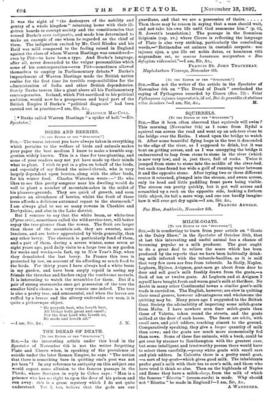SIR,—The warm interest you have always taken in everything which
pertains to the welfare of birds and animals makes your paper the best medium I know to make a humble sug- gestion widely known. This is a time for tree-planting, and some of your readers may not yet have made up their minds what to plant. I wish to put in a plea on behalf of the birds, and especially of my friend the missel-thrush, who is very largely dependent upon berries, along with the other birds, for his winter food. Charles Waterton wrote He who likes to see this pretty songster near his dwelling would do well to plant a number of mountain-ashes in the midst of his pleasure-grounds. They are quick of growth, and soon produce an abundance of berries, whilst the fruit of these trees affords a delicious autumnal repast to the stormcock."
I am always glad to see so many rowans in Cheshire and Derbyshire, and also in the Lake district.
But I venture to say that the white beam, or white-tree (Pyrus aria), sometimes called the wild service-tree, will better repay the tree-planter than the rowan. The fruit are larger than those of the mountain ash, they are sweeter, more luscious, and are better appreciated by birds generally, than any other berry. The shercock is particularly fond of them, and a pair of them, daring a severe winter, some seven or eight years ago, paid daily visits to a large tree in my garden for weeks and weeks,—in fact, up to New Year's Day, when they demolished the last berry. In France this tree is protected by law, on account of its affording so much food to the birds. For thirty years I have always had a white beam in my garden, and have been amply repaid in seeing my friends the thrushes and finches enjoy the toothsome morsels. It is interesting to watch the scrambles for them. But if a pair of strong stormcocks once get possession of the tree the smaller bird's chance is a very remote one indeed. The tree is also a pretty tree, and ornamental, and when the leaves are ruffled by a breeze and the silvery undersides are seen, it is quite a picturesque object.
"He prayeth best, who loveth best, All things both great and small ; For the dear Lord who loveth us, He made and loveth all."






































 Previous page
Previous page